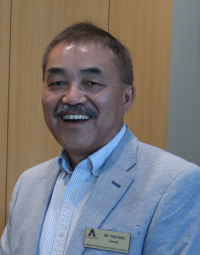Identifying Strategies to Improve Medication Safety at Home
Yan Xiao, Ph.D.
Professor of Nursing and Engineering
College of Nursing and Health Innovation
University of Texas at Arlington

“AHRQ is unique in its support of collaboration among researchers of varying and diverse disciplines, which is key to innovation and sustained improvement. AHRQ funding enabled me, an engineer, to team with practitioners from different fields to address significant patient safety challenges.”
Medication errors that occur at home, especially during transitions of care such as patient discharge from hospital to home, can pose a significant threat to patient safety. The preventable harms for these medication errors include adverse drug events (ADEs), unscheduled hospital readmissions, and emergency department visits. Nearly one in five patients experience ADEs within 45 days of hospital discharge. Older adults, aged 65 and over, visit the emergency department 4 times annually per 1,000 individuals.
There is an increased potential for medication errors as more responsibilities of medication management are taken on by people living at home. According to Yan Xiao, Ph.D., professor of nursing and engineering in the College of Nursing and Health Innovation at The University of Texas at Arlington, “Patients and caregivers often are not ready to take on the responsibility for medication management, including during the high-risk period during transition from inpatient to outpatient care.”
With AHRQ funding, Dr. Xiao, a human factors engineer, has studied and identified strategies to improve medication safety during care transitions by using a human factors approach. This approach aims to improve interactions for everyone involved—healthcare professionals, patients, and family members—by understanding the many differing factors that affect performance of the system, including the physical environment, tasks, and tools. These interactions then are redesigned to enhance patient safety in ambulatory settings.
In 2015, Dr. Xiao received an AHRQ grant to research and identify ideal ways to reduce preventable medication harms when patients move from inpatient to outpatient care. He found that although numerous patient-reported outcome measures have been developed, they generally have not been developed with a patient-centered approach. ”Patient input and perspective is an important aspect of helping to improve medication adherence and management,” Dr. Xiao said. As a result of his study, he outlined patient-centered recommendations, such as setting up and making adjustments to medication schedules, to help patients and their caregivers work together to achieve medication safety. Dr. Xiao also identified hazards or preventable risks to medication safety for older adults during care transitions. These hazards, ranked by order of frequency, were categorized into six groups: medication-related tasks at home; patient and caregiver related; hospital work system related; home resource related; hospital professional-patient collaborative work related; and external environment related.
Dr. Xiao received another grant in 2019 from AHRQ to develop a Patient Safety Learning Laboratory. The project, The Partnership in Resilience for Medication Safety Learning Lab (PROMIS Lab), aims to reduce preventable medication-related harm among patients aged 65 and older, including those with low socioeconomic status. The project focuses on redesigning interactions with patients and family members to improve medication safety in ambulatory and outpatient settings.
As Dr. Xiao was working on this project, the COVID-19 pandemic emerged in the United States. In 2021, Dr. Xiao received supplemental AHRQ funding to examine the impact of the pandemic on the delivery of primary care. The project also aims to identify medication risks to patient safety among underserved populations with health disparities, who have experienced disproportionally higher mortalities from COVID-19. This project ends in 2023.
Dr. Xiao has been an AHRQ grantee for more than 20 years, receiving his first grant in 2001. The goal of that 4-year project was to understand and reduce risks of central line-associated bloodstream infections, which have severe harmful consequences to patients. Using a human factors approach, Dr. Xiao identified frequent errors that occurred during the placement of central lines or central venous catheters. To counter them, he developed a Web-based training course with embedded video clips that demonstrated proper placement and how to avoid central line-associated bloodstream infections. After the study’s results were evaluated, they showed the course had improved clinician knowledge and retention of knowledge over time.
Following his initial project, Dr. Xiao served as a team member on several AHRQ-funded projects, ranging in topic from improving physician and nurse communication to enhancing primary care safety. He is a member of the editorial board for the journal, Human Factors, and was named a Fellow of the Human Factors and Ergonomics Society in 2021. Dr. Xiao also is a member of the AHRQ Patient Safety Network Technical Expert Panel.
Related AHRQ resources:
Principal Investigator: Yan Xiao, Ph.D.
Institution: The University of Texas at Arlington
Grantee Since: 2001
Type of Grant: Various
Consistent with its mission, AHRQ provides a broad range of extramural research grants and contracts, research training, conference grants, and intramural research activities. AHRQ is committed to fostering the next generation of health services researchers who can focus on some of the most important challenges facing our Nation's health care system.
To learn more about AHRQ's Research Education and Training Programs, please visit https://www.ahrq.gov/training.



